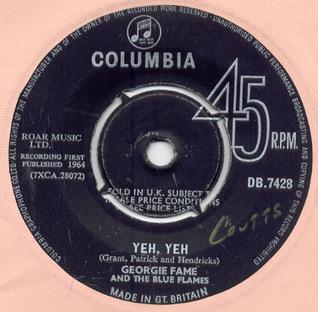
"Yeh, Yeh" is a Latin soul tune that was written as an instrumental by Rodgers Grant and Pat Patrick, and first recorded by Mongo Santamaría on his 1963 album Watermelon Man! Lyrics were written for it shortly thereafter by Jon Hendricks of the vocal group Lambert, Hendricks & Ross.
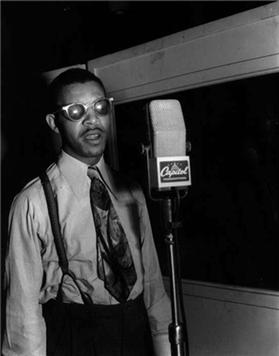
Albert George Hibbler was an American baritone vocalist, who sang with Duke Ellington's orchestra before having several pop hits as a solo artist. Some of Hibbler's singing is classified as rhythm and blues, but he is best seen as a bridge between R&B and traditional pop music. According to one authority, "Hibbler cannot be regarded as a jazz singer but as an exceptionally good interpreter of twentieth-century popular songs who happened to work with some of the best jazz musicians of the time."
"It's April Again" is a popular song that first appeared in the 1952 film Moulin Rouge. It became a No. 1 hit in the UK Singles Chart when recorded by Mantovani. The music for the film was written by Georges Auric; the original French lyrics were by Jacques Larue, with the English words by William Engvick. The Auric-Engvick song was published in 1953.
"Memories Are Made of This" is a popular song about nostalgia, written in 1955 by Terry Gilkyson, Richard Dehr, and Frank Miller. They were the members of a three-pieced group called "The Easy Riders", who served as a backing band for Dean Martin's version of this song, also released in 1955.
"Needles and Pins" is a rock song credited to American writers Jack Nitzsche and Sonny Bono. Jackie DeShannon recorded it in 1963 and other versions followed. The most successful ones were by the Searchers, whose version reached No. 1 on the UK singles chart in 1964, and Smokie, who had a worldwide hit in 1977. Others who recorded the song include the Ramones, Gene Clark, Petula Clark, and Tom Petty and the Heartbreakers with Stevie Nicks.

"Why Do Fools Fall in Love" is a song by American rock and roll band Frankie Lymon & the Teenagers that was released on January 10, 1956. It reached No. 1 on the R&B chart, No. 6 on Billboard's Pop Singles chart, and No. 1 on the UK Singles Chart in July. Many renditions of the song by other artists have also been hit records in the U.S., including versions by the Diamonds, the Beach Boys, and Diana Ross.

"Breaking Up Is Hard to Do" is a song recorded by Neil Sedaka, co-written by Sedaka and Howard Greenfield. Sedaka recorded this song twice, in 1962 and 1975, in two significantly different arrangements, and it is considered to be his signature song. Between 1970 and 1975, it was a top-40 hit three separate times for three separate artists: Lenny Welch, The Partridge Family and Sedaka's second version.
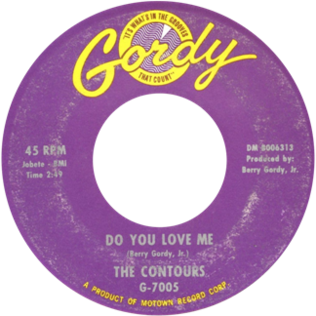
"Do You Love Me" is a rhythm and blues song recorded by the Contours in 1962. Written and produced by Motown Records owner Berry Gordy Jr., it appeared twice on the Billboard Hot 100 chart, reaching numbers three in 1962 and eleven in 1988.

"Do Wah Diddy Diddy" is a song written by Jeff Barry and Ellie Greenwich and originally recorded in 1963, as "Do-Wah-Diddy", by the American vocal group the Exciters. Cash Box described the Exciters' version as "a sparkling rocker that bubbles over with coin-catching enthusiasm" and said that the "great lead job is backed by a fabulous instrumental arrangement." It was made internationally famous by the British band Manfred Mann.
"Young Love" is a popular song, written by Ric Cartey and Carole Joyner, and published in 1956. The original version was recorded by Ric Cartey with the Jiva-Tones on November 24, 1956. Joyner was a high school student when she co-wrote the song with Cartey, her boyfriend at the time. It was released in 1956 by Stars Records as catalog number 539 and one month later by RCA Records as catalog number 47-6751. Cartey's version never charted.

Timothy Earle Thomas was an American R&B singer, keyboardist, songwriter, and record producer, best known for the hit song, "Why Can't We Live Together".
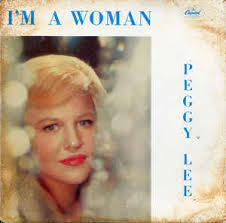
The song "I'm a Woman" was written by famed songwriting duo Jerry Leiber and Mike Stoller, and was first recorded in 1962 by Christine Kittrell.
Ronald Dyson was an American soul and R&B singer and actor. He had a lead role in the Broadway production of Hair and scored a top ten single in 1970 with "(If You Let Me Make Love to You Then) Why Can't I Touch You?"
Lucky Lips is a song written by Jerry Leiber and Mike Stoller. It was originally recorded by Ruth Brown in 1956 and was successfully covered by Cliff Richard in 1963.

"Hey There Lonely Girl" is a song released in 1969 by Eddie Holman. The original version, "Hey There Lonely Boy", was recorded in 1963 by Ruby & the Romantics. It was a hit for both of them. It has since been recorded by many other artists.

"Do It Baby" is a 1974 single recorded and released by the Motown R&B group The Miracles. The song was taken from the album of the same name, and written by Motown staff songwriters Freddie Perren and Christine Yarian and produced by Perren.

"With You I'm Born Again" is a 1979 duet written by Carol Connors and David Shire that originated on the soundtrack of the 1979 motion picture Fast Break. It was performed by Motown recording artists Billy Preston and Syreeta Wright and became an international hit for the duo, reaching number four on the Billboard Hot 100 and number two on the UK singles chart.

"Heaven Must Have Sent You" is a song written by Brian Holland, Lamont Dozier, and Eddie Holland when at Motown, and first recorded by The Elgins in 1966. It was also a 1979 disco hit single by Bonnie Pointer.
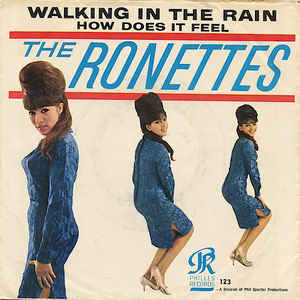
"Walking in the Rain" is a song written by Barry Mann, Phil Spector, and Cynthia Weil. It was originally recorded by the girl group the Ronettes in 1964 who had a charting hit with their version. Jay and the Americans released a charting hit cover of the song in 1969. The song has since been recorded by many other artists over the years, including the Walker Brothers.
"Trains and Boats and Planes" is a song written by composer Burt Bacharach and lyricist Hal David. Hit versions were recorded by Bacharach in 1965, by Billy J. Kramer and the Dakotas in the same year, and by Dionne Warwick in 1966.













